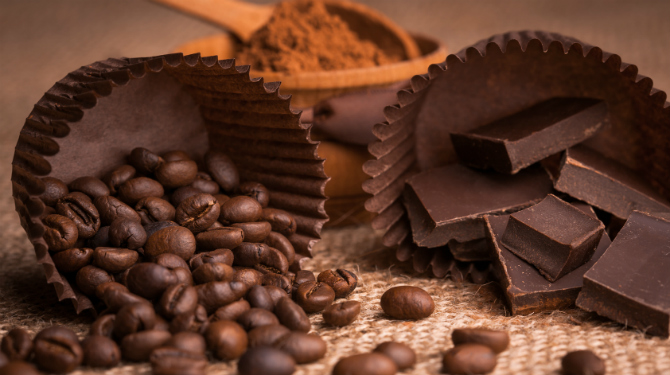
Cocoa Secrets You Should Know

Most parents wouldn't dream of giving their kids a mug of chai /coffee, but might delightfully serve a chocolate treat to their kids, which also contains caffeine. That's right! It’s not only Coffee, tea and colas that give you the caffeine, but your favorite bar of chocolate may also have small quantity of Caffeine.
Chocolate. There are only a few other foods that are congenial with almost every palate. It’s rich, smooth, creamy and makes us feel good, until the guilt sets in. Apart from its decadence, this cocoa product is further earning brownie points from the nutritionist, due to myriad of research studies showing its health benefits. However, there’s still much more we don't know about chocolate and recent research is helping us better understand how chocolate consumption affects our health.
Cocoa is the main ingredient in all chocolates. If you venture deeper into the darks of the holy food, you’d like to understand how and why a piece of chocolate perks you up almost unfailingly on any occasion. Cocoa beans are said to contain more than 300 known chemicals constituents and scientists have been working on isolating specific chemicals and chemical combinations, which may explain some of the pleasurable effects of consuming chocolate.
One such compound in cocoa is “Caffeine”, and although it is present in chocolate, it can only be found in small quantities. On your chocolate product labels, you will find it by one of the following names: Cocoa Solids, Cocoa Powder, Cocoa Mass or Liquor, Cocoa Butter. Except for Cocoa Butter which makes up for all the fat in the cocoa, all other forms have a small quantity of caffeine. The darker the chocolate, the higher would be amount of Caffeine. It is combination of caffeine and other stimulants that provides the "lift" a chocolate eater experiences.
Caffeine for years is under discussion, whether has positive or adverse impact on health. Pregnant females and the growing age lot, are groups of special anxieties. Caffeine in moderation has been shown to have a positive effect on both physical and mental performance. Studies have found that individuals who consume sufficient caffeine may experience temporary improvements in memory and reasoning ability. Recent research also suggests that caffeine in sufficient amounts may have a positive impact on athletic performance and endurance.
The possibility that caffeine ingestion adversely affects human health was investigated based on reviews of primarily published human studies obtained through a comprehensive literature search. Based on the data reviewed, it is concluded that for the healthy adult population, moderate daily caffeine intake is not associated with adverse effects.
Based on available evidence, safe levels of consumption of caffeine are suggested below:
| Age group | Safe level of consumption |
|---|---|
| Adult Male/Female | 400 mg (6 mg/kg body weight/day in a 65-kg person) |
| Reproductive-aged women | </=300 mg (4.6 mg/ kg body weight/ day for a 65-kg person |
| Children | </=2.5 mg kg |
Although caffeine content in chocolates is not alarmingly high, however since caffeine is present is an ingredient in several drugs, energy drinks, colas, tea, coffee etc., hence it is important to be enlightened about its content in the various foods, so that you would know if you've exceeded the level that most health experts say is a safe. It would make things easier if the caffeine content were listed on food labels.
Caffeine Content in Common Drinks and Foods:
| Item | Item Size | Avg Amount of Caffeine (in mg) |
|---|---|---|
| Cola | 5 mg | 30-45 mg |
| Cold Relief Medication | 1 tablet | 30 mg |
| Tea (5 min brewed) | 125 ml | 20-50 |
| Iced Tea | 250 ml | 70 mg |
| Dark Chocolate | 100 ml | 20 mg |
| Chocolate Milk Beverage | 200 ml | 5 mg |
| Instant Coffee | 200 ml | 57 mg |
| Milk Chocolate | 28 g | 6 mg |
Source: U.S. Food and Drug Administration and the National Soft Drink Association
So does chocolate contain caffeine? The answer is yes. Does chocolate contain lots of caffeine? The answer is no.
Chocolate has been found to contain enough caffeine to be of concern to people with heart or other ailments. For this reason, some doctors will recommend that some people who are not in good health not eat foods that contain caffeine. There is no evidence that caffeine causes children to become hyperactive or to develop attention deficit disorder. While low to moderate doses are generally safe, caffeine is addictive and users can become dependent on it and find it difficult to quit. If you eat too many caffeine-containing foods such as chocolate, you may experience rapid heartbeat, anxiety, depression, restlessness, sleep problems, tremors, nausea and vomiting.
Caffeine in chocolates is not known to many, probably due to publication bias. However, as a chocolate lover you may want to appreciate the larger picture of its constituents, which that makes its consumption an indulgent experience. Feel free to indulge in chocolate cakes at birthday parties, or a energy booster chocolate bar before work out or when the day seems to drag at office or a cup of tasty hot cocoa on a cold day — these choices don't pack enough caffeine punch to be harmful.
When food is eaten in moderation it can be enormously pleasurable, and one of the most pleasurable foods to be found anywhere is chocolate. Moderation is the key to keeping your and your kids' caffeine consumption under control.










